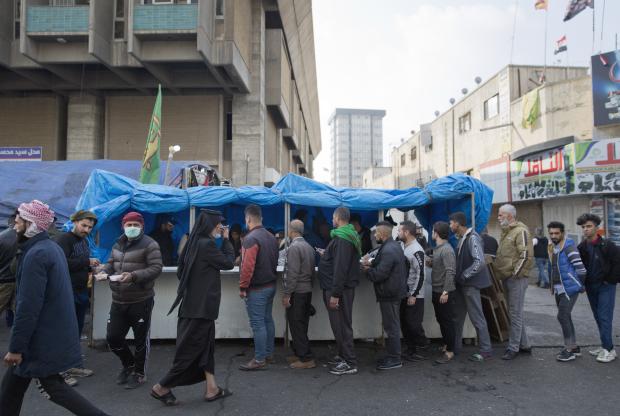Home-cooked food in Iraqi square brings protesters together

In this photo taken Sunday, Dec. 8, 2019, Iraqi protesters lineup by a volunteer chef to receive a free meal, in Tahrir square, Baghdad, Iraq. In Baghdad’s Tahrir Square, there are the anti-government protesters demonstrating for a better future for Iraq, and there are the volunteers who feed them. From stuffed lamb and fish, to the giant pots of soups and rice to the plates of lentils and beans, there is no shortage of food to go around. Volunteers from the capital and southern provinces cook traditional dishes that reflect the country’s rich cuisine and bring protesters together. (Photo by NASSER NASSER / AP)
BAGHDAD — In Baghdad’s Tahrir Square, there are the anti-government protesters demonstrating for a better future for Iraq, and there are the volunteers who feed them.
From stuffed lamb and fish, to the giant pots of soups and rice, to the plates of lentils and other beans, there is no shortage of food to go around. Volunteers from the capital and southern provinces cook traditional dishes that reflect the country’s rich cuisine and bring protesters together.
Tahrir Square has been the focal point for the protests that have continued to roil Iraq since Oct. 1. The spontaneous, leaderless demonstrations were organized on social media over long-standing grievances including government corruption, unemployment and a lack of basic services.
For many, the square in central Baghdad has become a miniature model for the kind of state they dream of, where factional and sectarian politics play no part and public services exist.
Services, including the near-constant supply of food, have been integral to keeping people in the square, but volunteers are eyeing a gradual drop in donations with concern.
Article continues after this advertisementIraqis are used to communal meals and many volunteer food. Every year, during the annual Shiite religious commemoration known as Arbaeen, volunteers prepare food for pilgrims making their way to their sects’ holy shrines in the city of Karbala. Shortly after the protests started Oct. 1, volunteers began setting up similar tents to cook and distribute traditional Iraqi dishes for the protesters in and around Tahrir Square.
Article continues after this advertisement“We make it for the hungry people, and people in need here in Tahrir Square,” said a woman who gave her name as Um Ammar, which means “Ammar’s mother.” She is from the southern province of Missan and was cooking Seyah, a thick mixture of rice flour and water fried on a hot plate.
Other popular dishes are lentils and beans; Tepsy, a traditional Iraqi casserole; Dolma, consisting of stuffed cabbage and grape leaves, onions and aubergines cooked in tomato sauce; and Makhlama, a mixture of potato, tomatoes, onion and egg all fried together and put in bread. It is a favorite breakfast for people in Baghdad.
“It is an old Baghdadi (dish). It is common in the morning. All the Iraqi people, but specifically the people of Baghdad, love this food,” said Muhsin Salman, a cook from the capital who was making Makhlama.
Arouk bread — a tandoor bread made of dough mixed with celery and spices — is another favorite.
And there are the popular sweets: Hareesa is boiled whole wheat sweetened with sugar and cinnamon. Cherek is baked wheat flour bread stuffed with dates. And there’s also the fried dough balls called Awamah.
On any given day, people can be seen lining up to fill plastic dishes with food. Protesters say the free food is important to help sustain the protest movement, especially for those who cannot afford to eat meat on a regular basis. But it’s not the main attraction, they say.
Hashem al-Jabouri said that after more than two months of protests, he’s worried that support for the movement is dwindling. Speaking as he fried falafel in a huge pot, he said support was not as strong as it was in the beginning. “There’s a lot of pressure and threats targeting the volunteers,” he said.
At least 400 people have been killed at the hands of security forces and unidentified assailants firing live ammunition and tear gas to disperse the demonstrations since the protests erupted in October. A string of targeted assassinations, forced disappearances and arrests of civil activists and journalists have also fostered fear among protesters.
Some said they will not be intimidated.
“I distribute food to my protester brothers. We will not retreat even if they kill or threaten us. We don’t care,” said Um Mohammed, who was cooking rice and beans on a recent day. Her husband was killed in Iraq’s sectarian conflict in 2006.
“I am a martyr’s wife, but it is OK,” said the mother of four. “I am not retreating and will not leave the square. My house is here now, until they give me my rights.”
/atm